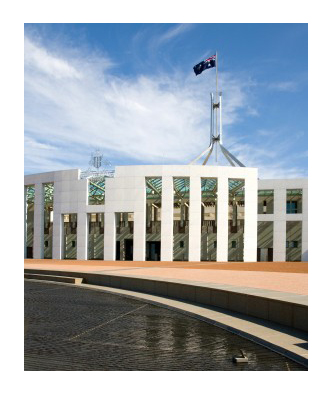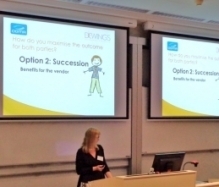October 2013 Newsletter
If you had trouble following the many promises made by both sides prior to the recent Federal election, you'd be forgiven for being a little confused about what we're actually getting now that we have a new Government. We outline some of the tax and business policies that have been announced by the Coalition.
We also provide a timely reminder about the deductibility of staff Christmas gifts, and highlight again how a good succession plan can maximise the value of your business.
In this edition...
-
A new Government - what happens next?
-
A reminder about staff Christmas gifts
-
Maximising the value of your business
A new Government - what happens next?
 There were a lot of promises made by both sides prior to the recent Federal election. Now that we have a new Coalition Government, it's worth a look at some of their more significant tax policy announcements.
There were a lot of promises made by both sides prior to the recent Federal election. Now that we have a new Coalition Government, it's worth a look at some of their more significant tax policy announcements.
Changes to car fringe benefits
Labor had announced changes to the Fringe Benefits Tax (FBT) rules that apply to motor vehicles. Without getting too technical, their plan was to scrap a long-held statutory formula for calculating the value of a car benefit provided to an employee, basing the valuation instead on actual use. This had caused considerable consternation for both the car industry and salary packaging specialists, as it had the potential to make motor vehicles less attractive as a salary packaging tool - which could mean less cars being sold. The Coalition has promised to scrap the proposal and maintain the status quo.
Scrapping some business tax breaks
The Coalition announced as a part of its pre-election policy costings that it would scrap two current small business tax breaks and the company loss carry-back provisions. The small business measures to be abolished are the immediate write-off for assets costing less than $6,500 and the immediate write-off of the first $5,000 of any motor vehicle purchase. A small business entity, by the way, is defined as a business turning over less than $2 million a year, so these changes will affect many small business operators.
The loss carry-back measures were introduced by the previous Labor Government to assist companies that were experiencing difficulties in the prevailing economic climate. They allowed companies to claim current year losses against prior year profits. Effectively what this means is if a company made a loss in 2013 and a profit in 2012, it could get a refund of some of the tax paid, which potentially resulted in a handy injection of cash to the business. It seems now that this benefit will have only been available for the financial year ended 30th June 2013.
Company tax rate cut to 28.5%
It's not all bad news for companies though. In an effort to stimulate business activity, the Coalition also promised to cut the company tax rate from 30% to 28.5% from 1st July 2015. It's worth noting though that for larger companies with taxable income greater than $5 million, an additional levy of 1.5% will be applied to fund the Paid Parental Leave scheme.
Paid Parental Leave (PPL) scheme
This is a measure that has been hotly debated. As it currently stands, the PPL scheme will commence from 1st July 2015 and provide 6 months paid parental leave. The scheme will pay the higher of the mother's actual wage (capped at a total payment of $75,000, or 6 months of a $150,000 pa salary) or the national minimum wage. There is no restriction on eligibility based on income - the only limitation is the cap. The scheme will be funded by the aforementioned 1.5% levy on larger companies.
Carbon tax to be scrapped
The new Government has wasted no time in commencing its promised repeal of the Carbon Tax, recently releasing a repeal bill for public consideration. The Carbon Tax will be abolished without affecting the associated income tax cuts and pension increases that accompanied it when the measure was introduced.
Proposed cap on deducting Self-education expenses to be abolished
The Coalition has signalled its intention not to proceed with the previous Government's proposed $2,000 cap on self-education deductions. This measure had been the subject of considerable opposition from the business, education and health care sectors because it also extended the definition of 'self-education' to include conferences and associated travel, whereas previously self-education expenses were limited only to courses undertaken at universities and other educational institutions.
Private health insurance
The current means testing for the health insurance rebate may be reversed when/if the budget can be returned to a stronger fiscal position. Not much else has been said about this so being that the timeframe and details are both so vague, it's not one we'd hold our breath for!
Superannuation
Compulsory employer superannuation contributions were scheduled to increase gradually over the next few years, from the previous rate of 9% to 12% by 1st July 2019. This strategy will be deferred under the Coalition, such that the 12% target will not be obtained until 1st July 2021.
In addition, the Coalition will discontinue the Low Income Superannuation Contribution (LISC) implemented by Labor. This was a good strategy because effectively it compensated low income earners who paid 15% tax on super contributions in their super fund, on the rationale that in such cases 15% was potentially more tax than they would have paid in their own name. However this strategy was to be funded by the so-called mining tax, so the motivation is largely political.
The Coalition has also signalled its intention to revisit the reduced level of concessional contribution limits and co-contribution payments when the budget is back in surplus.
In summary...
There is much work to be done and the new Government will be operating from a position of considerable fiscal constraint. There are some welcome measures here (and a few others that we haven't covered), but it remains to be seen whether the Coalition will deliver on all of its promises, or fall back on the tried and true first-term escape cry of "we had no idea the situation we inherited was this bad!" The Coalition may even find difficulty in getting some of its promises through the upper house, as already seems possible with the repeal of the Carbon Tax. Business confidence has received a shot in the arm with the change in Government, however it seems likely that there will be some pain ahead if the budget is to be returned to surplus in a reasonable timeframe. The sustainability of this boost in confidence will, in our opinion, depend largely on the way in which the return to surplus is managed and delivered.
A reminder about staff Christmas gifts
.jpg) It's hard to believe that we're now less than two months away from Christmas! Still, denial won't forestall the inevitable.
It's hard to believe that we're now less than two months away from Christmas! Still, denial won't forestall the inevitable.
If you operate a business that employs people and you're thinking about Christmas gifts, it's worth keeping in mind that there are varying tax consequences for your gesture, depending on what it is you choose to give.
If you're planning on giving something with a value of less than $300 per person, ideally you need to make sure that it is non-entertainment in nature. Keeping the value under $300 will ensure that the value of the gift is not subject to Fringe Benefits Tax (FBT), and as long as it is not entertainment in nature, it will be tax deductible to your business. Gifts that are considered to be entertainment are still not subject to FBT if they are under $300, but because of the entertainment component of the gift, the cost is not deductible and a GST credit cannot be claimed. This begs an obvious question of course - what constitutes entertainment?
This is where things get a little vague and the Tax Office's interpretation may at times seem arbitrary. Gift vouchers, hampers, wine, chocolates and so on are not considered to be entertainment (even though by their very nature they may be entertaining), whereas tickets to an event such as a play or a musical, or tickets to the movies, are entertainment. Generally speaking the rule seems to be that if there is an object involved, it is not considered to be entertainment.
A simple cash gift will not be subject to FBT but cash is remuneration in the hands of the employee and will be taxable to them. So ideally you want to avoid giving cash.
Naturally, we don't recommend that tax be your first consideration when deciding on a Christmas gift. The gesture itself is the most important thing. But if there a number of possible options, making the right choice could save you a considerable amount of tax.
If you'd like to find out more or have any questions about your specific circumstances, please contact us.
Maximising the value of your business
 As a part of our ongoing commitment to the eye-care industry, director Kathy Allen was in Sydney last month as a guest speaker for the Optometric Internship Program.
As a part of our ongoing commitment to the eye-care industry, director Kathy Allen was in Sydney last month as a guest speaker for the Optometric Internship Program.
Kathy was a part of a panel of speakers from the industry that gathered to share their experiences on planning for the future. In particular, Kathy was asked to speak about determining the value of a practice and what you can do to maximise it. This included some practical examples of how a good succession plan can increase the return on a business investment significantly.
One of the issues that many businesses face in the current climate is that regardless of the amount of blood, sweat and tears that have been poured into a business over the years, when it comes time to sell there simply may not be the buyers there who are willing to pay you what you think it is worth. Developing a plan to pass your business on to someone who already works for you can reduce the barriers to buying and increase the amount that ultimately ends up in your pocket. It takes times and diligence, but the outcomes can be stunning.
Whether or not you work in the eye-care industry, all business owners need to start thinking about a succession plan at some point in the course of their business life. Perhaps your plan is simply to sell when the time comes. Even so, there is much you can be doing to increase the potential sale price. But a plan to hand it over gradually to a current employee will more than likely maximise the value of your business.
We can help. If you'd like to start the process, or at least have a chat about it, please arrange a complimentary meeting with us.
 Download PDF Newsletter
Download PDF Newsletter